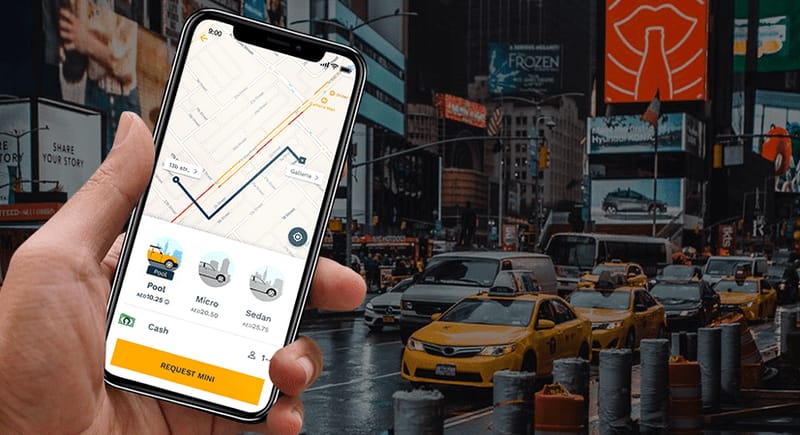
A group of entrepreneurs in Nigeria plan to start a new ride hailing technology startup. They have developed a mobile app that connects passengers with drivers for transportation services. They are ready to register the startup and launch their platform. They have approached you and sought your legal advice on how they can successfully achieve their objective. Advise them appropriately.
ANSWER
- WHAT TYPE OF BUSINESS STRUCTURE IS MOST SUITABLE FOR AN E-HAILING TECH STARTUP IN NIGERIA?
E-hailing is the use of mobile application and smart phone to request, reserve and use MicroTransit service. It is used to book public transport through electronic applications. Passengers are connected to their desired drivers to transport them to their location. It has made transportation easier, convenient and affordable for individuals who are willing to travel by road.
In Nigeria, choosing the right type of business structure for your business is very important just like starting the business itself. A business structure will determine the legal form your business will take ranging from daily operations and how much you pay in taxes down to your ability to raise funds. There are several business structures an entrepreneur can choose from, keeping in mind that all these structures are only suitable for certain kinds of businesses. They include; Sole proprietorship, Partnership, Limited Liability Company, Public Limited Company, Incorporated Trustees, etc.
It must be noted that a startup granted a label outside the company business structure can only exist for six months. According to the provision of The Nigerian Startup Act 2022, a startup in a sole proprietorship business structure can only be granted a pre-label status for a period of six months to enable it transition into a limited liability company. A Limited Liability Company is the only type of company a startup can undertake under the Nigerian Startup Act 2022.
A Limited Liability Company is a business entity that prevents individuals from being liable for the company’s financial losses and debt liabilities. In the event of legal action or business failure, liability is assumed by the company rather than its constituent partners or shareholders. There are of two types; Private Limited Company and Public Limited Company. For a startup, it is advisable that it register as a Private Company because it attracts investors who are willing to invest in the business and there is equal sharing among founders and investors.
Therefore, flowing from the above explanation, the most suitable business structure for an E-hailing tech startup in Nigeria is a Private Limited Liability Company.
2. WHAT SPECIFIC LEGAL REQUIREMENTS AND REGULATION SHOULD THE STARTUP COMPLY WITH?
There are certain legal requirements and regulations an E-hailing startup business must comply with. In Lagos state, which is the economic hub of Nigeria with over 20 million people, has identified the need to have laws and regulations governing the ride-hailing business. This has led to the enactment of On-line Hailing Business and Taxi Cab Operation in Lagos State 2023 which has provided a comprehensive list of the rules that must be followed by an entrepreneur who wishes to start a ride-hailing business. The requirements includes;
- Registration: The company must be registered with the Corporate Affairs Commission (CAC). The registration fee payable to the CAC depends on the proposed company’s minimum issued share capital. The general mandatory minimum for a Limited Liability Company registration in Nigeria is #1,000,000 (One million naira) but where a foreigner is either the shareholder or director of the company the prospective e-hailing company must register with a minimum share capital of #10,000,000 (Ten million naira).
2. License: In Lagos state, according to the Amended Regulation For On-line Hailing Business And Taxicab Operation In Lagos State 2023, it states that “The Taxicab license shall be the authority to operate a taxi services for either of the two categories, which are;
a. Service Entity: This are mobile app owners or E-hailing platform owners who do not own or operate the commercial vehicles but provide support services. They provide and manage the e-platform and facilitate connections between taxi owners and passengers through their mobile app.
b. Taxi and App operators: This is an individual who is in charge of both the vehicle and the mobile app i.e He is the owner of the vehicle as well as the app and he might also have a third party fleet (vehicle) in its operations.
3. Driver and Vehicles documentation: Ride-hailing companies must ensure that all affiliated drivers complete and possess the necessary documents and licenses and the vehicles to be deployed for e-hailing business must meet some certain conditions.
DRIVERS REQUIREMENTS
1. Must be at least twenty-one years of age and a citizen of Nigeria.
2. Must possess a valid National Driver’s License.
3. All drivers registered with an operator must be literate
4. Must have a Lagos State Residents Registration Agency Card (LASSRA)
5. Original annual certificate of competence from Lagos State Driver’s Institute (LASDRI) to assess their proficiency along with the LASDRI Card.
VEHICLE REQUIREMENTS
- The vehicle must be brand new (for corporate taxi)
- Where the vehicle is not new, it must be within the first three years of its manufacture as specified by the manufacturer.
- The capacity of the vehicle must not be less than 1.3cc
- A completed, signed and dated safety measures compliance form prescribed by the ministry.
3. HOW CAN THE STARTUP PROTECT ITS INTELLECTUAL PROPERTY SUCH AS THE MOBILE APP AND BUSINESS MODEL
According to World Intellectual property Organization (WIPO), Intellectual Property refers to creation of minds, such as inventions; literary and artistic works; designs; and symbols, names and images used in commerce. The three main legislation that protects intellectual property are The Copyright Act, The Patents and Design Act and The Trade Mark Act. Intellectual Property Rights provides exclusive rights to inventors in order to enable them reap commercial benefits from their creative works.
Intellectual Property is important for startup businesses because it can be used to generate revenue through licensing and merchandising and also it attracts investment as investors are often willing to invest in companies that has strong IP protection. Therefore, it is important that E-hailing startup business protect its intellectual property especially the mobile app and business model. This can be done by utilizing any of these Intellectual Property;
- Copyright: Copyright offers protection to the original work of an author that involves some form of expression. This includes music, lyrics and dance, photography and painting and even software that falls under the literary works. Copyright can only protect a mobile app against copying. The elements of the app that might qualify for copyright protection include the following;
-Source code, which can be protected as a literary work.
-Graphical User Interface, which can be protected as artistic work.
-Logo and icons, which can be protected as artistic works.
-Text, which can be protected as a literary work.
Copyright do not need to be registered in the app to gain protection, it arises automatically. When enforcing the rights, one must prove that he owns the copyright. It is advisable to keep records of the development process. Copyrights are protected for 70 years from the end of the year in which the creator died.
2. Trade Mark Protection: Trade Mark is a source identifier that distinguishes the origin of goods and services in the stream of commerce. It includes names, words, signatures, symbols, logos, packaging of goods, shape of goods, combination of colors etc. A trademark could qualify for registration if it meets certain statutory requirement such as being distinctive from other goods or services. Trade Mark cannot protect the technical elements of an app but it can enable an app to stand out from the millions of similar offerings and prevent third parties from using the same branding in their own apps. A trade mark lasts longer than any other intellectual property rights provided it is renewed every ten years, it will last forever.
3. Patents: It is a legal protection that confers specific rights upon investors, granting them exclusive control over the commercial exploitation of their innovative and useful inventions. To avail themselves of these rights, investors must formally register their inventions if their inventions are new and are industrially applicable. Patents last for 20 years, after which the invention becomes part of the public domain and can be used by anyone.
4. Trade Secrets: Trade secrets are any confidential information about a business that gives it a competitive edge. It must be disclosed to a small number of people and also, reasonable steps must have been taken to keep it a secret. There is no need to register a trade secret to obtain legal protection, the law will deem an information a trade secret if proactive steps are taken to protect it and keep it confidential. Source code, Algorithms, Data and Analytics are example of elements in a mobile app that can be protected as a trade secrets.
Through the above mentioned Intellectual Property rights, startup businesses can protect its intellectual property against third parties. In addition to technical safeguards, effective intellectual property protection is crucial.
4. WHAT ARE THE POTENTIAL CHALLENGES AND RISKS ASSOCIATED WITH OPERATING AN E-HAILING TECH STARTUP IN NIGERIA?
In recent years, the e-hailing industry in Nigeria has faced significant challenges due to government regulations that pose a substantial risk to the survival and even elimination of market participants. The initial endeavor to establish regulations for the ride-hailing business have engendered significant controversy, resulting in strained relationships between service providers and regulatory bodies within urban areas of Nigeria. Some of the challenges associated with operating an e-hailing business for startup includes;
1. Trust Issues: Trust in simple terms is the belief in the ability of someone or something. Despite the impact of e-hailing on urban transport in Nigeria, the industry has suffered several challenges such as insecurity and lack of safety for user-groups. In the ride-hailing industry, both drivers and passengers are aware of the risk in engaging with a complete stranger via an app which is monitored by platform companies through data analytics and algorithms. For example, Mr Ade, the Taxi driver has just accepted his first trip for the day, but later declines because the passenger would only pay via an ‘online bank transfer’ and from experience, the driver does not trust this process because it is often a fraudulent tactic used by riders without money. One of the many instances where rider loses trust is through trip manipulations by driver. Trust issues surrounding usability and culture remains a stumbling block in e-hailing business especially for startups.
2. Lagging Regulatory Framework: Traditional regulations struggle to keep up with the rapid advancement in technology. E-hailing services disrupt conventional taxi systems, creating friction with existing law. Governments, in their attempt to update these laws, often introduce inconsistent regulations that leave startups grappling with operational uncertainties.
3. Competition with Traditional Services: E-hailing services frequently clash with traditional taxi unions and transport operators, who see them as unfair competition. These traditional operators often wield significant political influence, swaying regulatory actions against e-hailing companies. Governments, balancing the interests of these groups with the modernizing pressures from e-hailing services tend to implement regulations favoring the status quo.
4. Increase in Operational Costs: In Nigeria, as fuel price rise, ride-hailing startups will face escalating operational costs. These platforms usually operate on a commission based model, where a percentage of the fares goes to the company. As fuel expenses surge, drivers are compelled to spend more on fuel to meet the demands of their passengers.
Despite the challenges, E-hailing tech startup can still navigate the industry and shape the future of Nigeria’s transportation.
5. WHAT ARE THE NECESSARY LICENSES AND PERMITS REQUIRED TO OPERATE AN E-HAILING SERVICE IN NIGERIA?
I will be focusing on Lagos state which serves as the de-facto commercial and financial big brother in the Nigerian economic system and where it seems to be a thriving business sector. In Lagos state, there are criteria that must be met before an individual or corporation can be permitted to carry out an e-hailing service. These criteria are regulated by Guidelines for On-Line Hailing Business Operation of Taxi in Lagos State, 2020.
At the beginning of regulatory engagement with the Lagos state government, the initial plan was for the drivers to pay a license fee on each vehicle but the government has now changed its position. Under the new regulations, the license fee now stands at #10 million for every 1000 e-hailing taxis. There is also an annual renewal fee of #5 million.
Company Registration: An e-hailing service must register with the Corporate Affairs Commission (CAC). Minimum issued share capital; #1,000,000 for a local company and #100,000,000 if a foreigner is a shareholder or director.
Licenses: Obtain license according to the Guidelines for Online Hailing Business Operation of Taxi in Lagos State 2020. Service Entity Permit (for app owners or platform providers) or Operator’s Provisional License (for owners and operators of both the vehicle and the app)
Applicable fees for Service Entities
Initial Licensing: Up to 1000 units, #10,000,000
More than 1000 units, # 25,000,000
Annual Renewal: Up to 1000 units, #5,000,000
More than 1000 units, #10,000,000
Transaction fee: 10% of each ride.
Applicable fees for Taxi and App Operators
Initial Licensing: Up to 50 units, #5,000,000
More than 50 units, #10,000,000
Annual Renewal: Up to 50 units, #1,500,000
More than 50 units, #3,000,000
Transaction fee: 10% of each ride
Driver and Vehicle documentation
Drivers:
* Must have a valid driver’s license
* Must have a Lagos State Residents Registration Agency card (LASRRA)
* Must possess a Lagos State Drivers Institute Certificate and Card.
* All drivers must be literate.
Vehicles:
*Must have a title or manufacturer’s certificate of origin
* Must have a bill of vehicle sale or vehicle lease agreement
* Must have a taxicab license, special plate number, proof of ownership, pre-registration inspection certificate, roadworthiness certificate, comprehensive insurance policy, vehicle license, hackney permit, approved route document and driver’s badge.
Other license and permits required to operate an e-hailing service includes; Federal Inland Revenue Service, State Level Permits, Vehicle Inspection Certification, Third Party Liability Insurance and National Information Technology Development Agency (NITDA)
REFERENCES
https://koriatlaw.com/how-to-set-up-ride-hailing-transport-company-in-lagos-state/
https://harperjames.co.uk/article/mobile-apps-intellectual-property/











